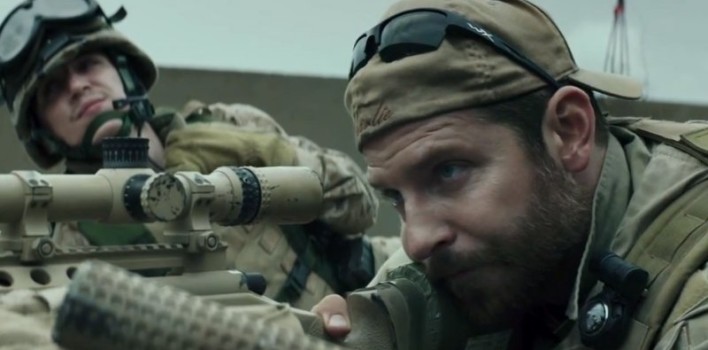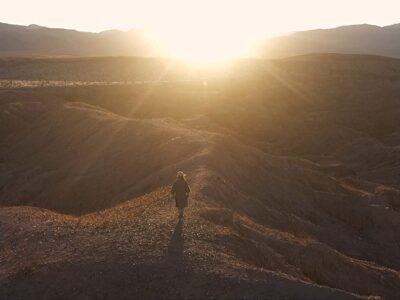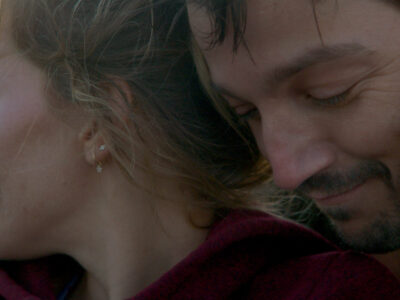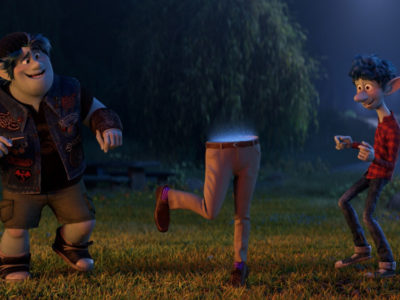Shepherding an American Sniper’s Heart
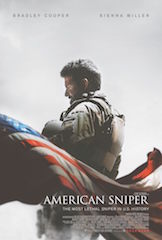 American Sniper opens with a sequence where a young Chris Kyle (Bradley Cooper) is thrust into the protector role of his younger brother, Jeff Kyle (Keir O’Donnell), when he is attacked by a bully in the schoolyard. When their father demands an explanation at the dinner table that evening he tells his two young boys that there are three types of people in the world; sheep, wolves, and sheepdogs. He chastises them to not be helpless, mindless sheep, and he pulls out his belt to threaten them to not be wolves. The sequence ends with their father extolling the virtues of being a sheepdog, a rare breed that leads the sheep and protects them from wolves. He then approves of Chris’ busted knuckles as evidence that his son took appropriate action with his younger brother’s bully.
American Sniper opens with a sequence where a young Chris Kyle (Bradley Cooper) is thrust into the protector role of his younger brother, Jeff Kyle (Keir O’Donnell), when he is attacked by a bully in the schoolyard. When their father demands an explanation at the dinner table that evening he tells his two young boys that there are three types of people in the world; sheep, wolves, and sheepdogs. He chastises them to not be helpless, mindless sheep, and he pulls out his belt to threaten them to not be wolves. The sequence ends with their father extolling the virtues of being a sheepdog, a rare breed that leads the sheep and protects them from wolves. He then approves of Chris’ busted knuckles as evidence that his son took appropriate action with his younger brother’s bully.
Chris Kyle grows into a man and is portrayed as the kind of war hero that your country wants. He’s a cowboy; so he’s tough. He has integrity; so he stands up for what’s right. He’s patriotic; so he doesn’t question the war effort. Chris Kyle becomes a Navy SEAL to fight for “the best country in the world” and protect everything that he loves about, and everything in, his country. That sheepdog mentality, the one idolized by his father, has made him the ideal soldier. Despite his older age when he enlists, he quickly gains the respect and admiration of his fellow soldiers. Later, on the battlefield, he strikes fear into the Iraqi insurgents. His comrades call him “Legend” because of his exploits while his enemies nickname him “The Devil of Ramadi” and go so far as to put a hefty bounty on his head.
While he racks up sniper kills in Iraq (a confirmed 160 kills over the course of his four tours), back home he has been changing and it has not gone unnoticed by his wife, Taya (Sienna Miller). Over time Chris finds it harder and harder to allow his mind to leave the battlefield, even when he returns home. His thoughts are in Fallujah, either wanting to save lives or regretting the lives that had already been lost. It takes a toll on him and it takes a toll on his wife and young children. Chris becomes unresponsive to his wife’s help and does what, presumably, any “sheepdog” would do; Despite the pain and anguish he carries on, but not without repercussions.
Unlike other films that we’ve recently reviewed that wove a dual message of anti-war and pro-war (listen to our Fury podcast), Clint Eastwood, director of American Sniper, chose to focus more on a man than a mission or “side” of the debate. What we get is both an inspiring story of a wartime hero and a cautionary tale of the modern soldier and the modern man. Chris Kyle was an incredible soldier and legendary sniper, but he is also portrayed as a man, troubled by what he had seen and done in wartime, unable to cope with those actions to the detriment of his personal and family health.
It’s the duality of being a leader in more than just times of war, but any arena where a strong leader is called for. You must be unflinching, able to forge ahead despite the naysayers, and able to do things that you know are for the greater good despite consequences. As a result, this singular focus, if unchecked, can lead to the breakdown and even dissolution of your closest relationships. How many times have we seen some of our greatest leaders and heroes suffer epic moral and/or relational meltdowns? It could be called the blessing and curse of the sheepdog, or by another name; the peril of the shepherd.
Chris Kyle’s story shares many parallels to the story of another sheepdog/shepherd from history; King David. While similar in some respects (they were soldiers and leaders and also shared the shepherd mentality), their herds were slightly different. David was literally a shepherd of real sheep before eventually becoming shepherd of the entire nation of Israel. Meanwhile, Kyle felt the weight of who he was and what he had accomplished while becoming a shepherd of soldiers. At multiple points in the movie Kyle proves his mettle by protecting the Marines clearing buildings or joining them on the ground trying to track down a deadly Iraqi insurgent. His father’s call to be a sheepdog and to shepherd those in danger echoes throughout his life as a soldier and leader.
While being of great virtue on and off the battle field, like King David, Chris Kyle was not without his faults. He was a tough guy, a cowboy, and it was that macho and overly masculine attitude that cost the lives of some of his friends in battle and also put strain on his family back in Texas. He refused to expose his family to the the horrors of war by opening up to them so he suffered. Cooper’s performance exposes that machismo-laced attitude (something that is often highly valued in male circles in our current society) as actually being hurtful and dangerous to those we love. Regrettably, the consequences and danger of this definition of masculinity is not explored enough in the film. It’s the type of moments that come in the final third of the film that see his macho mentality breakdown. Those moments could have fleshed out Chris Kyle a little more and given us more to chew on. It would have been great to explore the mind of a mentally wounded soldier further; something that Cooper’s Silver Linings Playbook co-star Jennifer Lawrence recently has done well in The Hunger Games series.
American Sniper does the best it can with the material Chris Kyle provided in his autobiography of the same name, but it surprisingly falls short of hitting on a deeper and more spiritual and emotional level. The setup was all there, however I am not sure if Eastwood couldn’t take those kind of liberties to give us something deeper, or if he was just unwilling do so. While giving us a fair number of talking points to consider and also having some well-directed, well-shot, and well-acted scenes, the movie felt hastily concluded and did not pack the emotional punch it could have. I did like it, I just thought I would like it more.
However, I want to know what you thought. Leave some comments and keep the conversation going with Reel World Theology on Facebook and/or Twitter.
Josh Crabb (@HeyItsThatJosh) is an editor, writer, and sometimes talker for Reel World Theology. He has been married to Tina for 9 1/2 years and has four amazing children. He is also pastor at Appleton Gospel in Appleton, WI and church planter for the EFCA planting in Neenah, WI.


